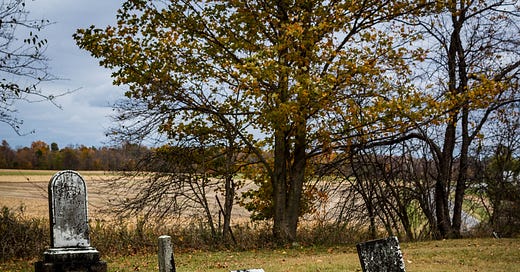When a young pastor, I recall leaving a graveside service. Outwardly, I seemed calm and serious. Inwardly, I was berating myself for forgetting parts of the Lord’s Prayer.
Yep. Forgetting.
I hardly knew the son and daughter of the recently deceased. They’d called my church, searching for a minister to help in their “hour of need.” With the simple service finished, the two siblings walked behind me toward the parking area. Only a few steps ahead, I overheard their conversation. Were they exchanging snide criticisms about the stupid pastor who didn’t know the words to Christianity’s most famous prayer?
They were not.
They were arguing about their mother’s will and her possessions.
I had forgotten the Lord’s Prayer’s final sentences. How embarrassing! At the open grave of a stranger, with a handful of her family present, I’d shut my Book of Worship and then invited the mourners to pray with me. It was just the Lord’s Prayer. They were words I’d memorized as a kid in Sunday school and had recited every Sunday (and more) throughout my life. But that day represented one of my first graveside services. Nervous, I blanked. Faking a few final mumbled words, I hurried to the “Amen.”
The family didn’t know me. They also likely didn’t know any formal prayers, including the “one Jesus taught his disciples to say.” Like most pastors, I occasionally received calls from strangers asking for help with a funeral or wedding. I met twice with this family: once to plan the service (“Mother just wanted a few words and a prayer, pastor…”) and once at the grave.
I learned a couple of things that day.
First, since that dismal day, I’ve always added the Lord’s Prayer—in large font—to any notes I’ve written. I also bookmarked the Book of Worship’s page where the prayer’s located. Be prepared!
Second, some families fight about possessions rather than supporting each other in their grief.
Money divides us.
Possessions own us.
Wills serve as battlegrounds.
The absence of a will creates a warzone.
Every sibling claims a different version of what Mom or Dad “promised me.”
The family member designated as the executor is selling the parents’ house too fast (or too slow) and for the wrong price and . . .
Or there is no appointed executor, only squabbling siblings threatening lawsuits.
When I worked in bereavement for a hospice, I contacted people during the year following a death. One of the early, typical comments made by grievers involved “the business of the estate.” The endless to-do lists are overwhelming. Often those “taking care of the business” admitted to being glad for the demands and deadlines. After all, canceling credit cards or contacting insurance agents proved easier to manage than shedding tears. If they were busy, wouldn’t they avoid the emotional cost of grieving*?
But for a few, and maybe more than a few, the “business of the estate” doesn’t involve grief avoidance or the dreary, teary list of inevitable tasks.
Like the brother and sister that argued as we left their mother’s grave, there will be disagreements. The reasons for a family’s divisions usually exist long before anyone’s death. The debates, blaming, and threats don’t take a break when the grave is dug or the ashes fill an urn. Possessions possess us. Money isn’t about saving for the future, but making sure others lose in the present.
I have no one-size-fits-all solution to these sad situations. Nonetheless,
I hope every family talks openly about preferences for care and comfort long before a loved one is diagnosed with a life-threatening illness. Ask about and complete the POLST and DNR forms. Create the living will for health care issues and inform everyone directly impacted by the eventual death of a loved one about those forms’ contents.
Craft a will that easily explains the needs of the estate. Let everyone mentioned in the will know about it and read it. Let loved ones ask questions. Answer the questions. Wills should be open books, not closed tomes.
But people procrastinate. They keep secrets. Money, real or imagined, is used to manipulate future choices or to fuel guilt born from past decisions. And there are families so profoundly dysfunctional that nothing will prevent them from attacking and counter-attacking each other.
I have one feeble suggestion, based on what I’ve learned from the dying. In early, extensive research (from 2015) done with Oregon’s two-decades-old Death with Dignity choice, the top reason patients used—or consider using—prescribed drugs to end their life involved losing autonomy. In other words, losing personal control. Yes, many don’t want to be a burden and others dread physical pain, but the loss of control led all reasons.
Maybe that’s a roundabout lesson for those confronted by family members focused on the money or possessions after the death. What can you control? As hard as it may be, isn’t it better to let go and not battle another family member over “things?” It’s almost impossible to control another’s irrational, hurtful, greedy actions, but you can decide not to participate in their selfish schemes.
Am I naïve in hoping other family members won’t join in a battle over possessions? Probably. But in that kind of “war,” everyone loses. Control what is best for you: give yourself time to grieve and make time to be with people who will lovingly support you.
+++++++++
*By the way, the answer to that question is a resounding NO!
Photo by Wendy Scofield on Unsplash
My book, A Companion for the Hospice Journey, is available at Amazon.



